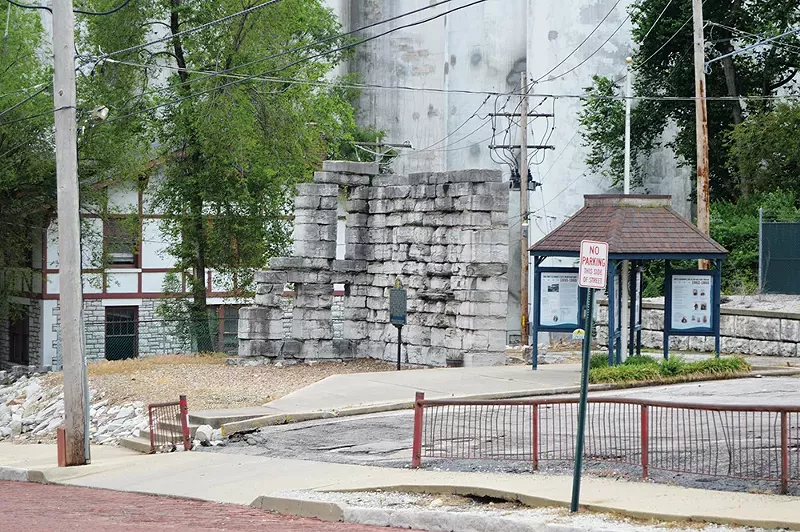COURTESY PHOTO
I love beer. When I say that, I don’t mean I love a specific beer, or that I’m devoted to a particular brand or style. I love all beer. From Alpha King pale ale to Zwickel lager and every milkshake sour, Malort-barrel-aged stout, Busch Light Peach, gluten-free milk porter, and mango habanero hefeweizen in between, I enjoy them all. That’s why I rarely have the same beer twice — I consider it a missed opportunity to try something new.
We live in heady times when, in most American cities, you could drink a unique beer every day for a year (maybe two) without having to leave the metro area. But even in a scene as storied, vibrant and inventive as St. Louis, you’d still be missing out. Beyond our cityscape, out in the small towns and rural corners of central and southeastern Missouri and southern Illinois, there are dozens of rural and small-town breweries. These families and artisans are producing more than just unique flavors and new takes on traditional styles; they are expressing themselves and their communities through their beer. Some reach back to deep local farming and brewing traditions, while others are making bold new statements with their brews and pushing the art form forward. Some are windows into the natural world and true reflections of the land they are built on. Some are mom-and-pop businesses trying to revive and revitalize dormant storefronts and main streets. And some are parts of a larger community, stars in a scattered constellation of craftspeople, chemists, artists and even modern-day alchemists who just want to share their products and their love of beer.
So with all these far-flung destinations, where is a thirsty St. Louis traveler to start? Fortunately for you, I’ve done the work and persuaded my wife to take the wheel as I mapped out — and then journeyed along — three separate beer trails that will give you a diverse flight of options to sample the region’s wares. Each route is roughly within two hours of the city and at most, a four-hour day trip, if you can find a safe and responsible way back. And don’t forget to pack a couple growlers to bring home some souvenirs.
Who’s ready for a beer run?
Southeast and Across the River

TYLER GROSS
We were about 90 minutes into our drive through the soybean and corn fields of southern Illinois when the GPS told us to turn off State Route 4 and onto narrow, unlined Marlboro Road. Eventually, that led us to a gravel drive that descended into the woods. There were no signs; we had no idea whether we were still on the right path or if the satellites had lost us. We rolled down the windows as if there might be a sound or voice to guide us, but all we heard was the wind, the rustling of leaves and the crunch of dirt beneath our tires. We kept going.
I’m glad we did. Not only was the journey worth the one-of-a-kind beers we got at the end, but it was an essential part of the Scratch experience.
Unlike pizza, barbecue, wine or even whiskey, beer is rarely of its place in America. Sure, you can sojourn to Vermont or Portland, Maine, to get an authentic New England IPA or fly to the hop farms of Washington’s Yakima Valley to taste the freshest-hopped pale ale imaginable. Sometimes a local brew might be flavored with honey from a brewer’s backyard hive, coffee from a roaster down the street or even donuts from a cross-town bakery. But for the most part, any beer you drink in the U.S. is made from a style, method and ingredients that are more or less foreign to where you are drinking it.
Scratch Brewing Company (264 Thompson Road, Ava, Illinois; 618-426-1415, scratchbeer.com), a microbrewery and farm five miles from the Shawnee National Forest, is one notable (as in two-time James Beard Award-nominated) exception. Here, the focus is on making beer with plants, herbs, fruits, leaves, nuts and roots that are almost exclusively homegrown, locally farmed or foraged from the surrounding fields and woodlands.
“Our goal was always to create beer that had a sense of place and represented our neck of the woods,” says Marika Josephson, who co-owns Scratch with Aaron Kleidon. “We always envisioned Scratch as a place where people would come and drink and experience beer in the place where we were growing the ingredients.”
At Scratch, the ode to soil isn’t just ad copy on a label or a spiel from the barkeep. Sitting outside under the brewery’s awning on a late-August afternoon, I can hear hickory nuts bouncing off the tin roof and know that they’ll eventually find their way into beers like the Single Tree Hickory sour ale, which also incorporates the tree’s leaves and bark. From that same seat, I can look over at the garden in front of the brewhouse and see the purple blossoms of wild passion fruit plants transplanted from elsewhere on the property (who knew passion fruit grew in southern Illinois?) while sipping on the Maypop, a tropically aromatic passion fruit farmhouse ale brewed without hops.
Josephson tells me that, starting this year, she or one of her crew will lead forage walks with a group of up to 15 people to search for black trumpet mushrooms, smelling basil and crushed maple leaves in their hands, before returning to base to brew their finds into teas and pop some Scratch bottles to appreciate how those ingredients can be interpreted into beer.
The food — a crucial part of any beer marathon — is likewise locally sourced. While there, we ate bread and pizza dough baked from a house sourdough culture in a wood-fired brick oven and produce grown on site. The creamy goat cheese is one of the farthest travelers, hailing from Baetje Farms just outside of Ste. Genevieve.

AARON KLEIDON
“We were homebrewing on that land when it was just water running through the woods to a camper that Aaron’s family used for hunting and fishing in the lake,” Josephson says. “When we decided to open the brewery here, we just said, ‘This feels right. Hopefully the people will come.’ And they did.”
On our way back to St. Louis, about 30 miles up Route 4 from Scratch, we once again found ourselves in a brewery surrounded by woods — but this time in the middle of the town of Sparta. This timber was towering stacks of oaken barrels where the farmhouse ales and stouts of White Rooster Farmhouse Brewery (113 West Jackson Street, Sparta, Illinois; 618-449-2077, whiteroosterfarmhousebrewery.com) have been aging.
These wild fermentations were tame compared to those at Scratch — but they still came with the funk. Offerings ranged from the delightfully tart Multiverse with coconut, guava and papaya to the extremely approachable (and only 3.8 percent ABV) Kairos Peach/Apricot made with a black tea blend that contains lemongrass, calendula and safflower to smooth out the sweetness. The stouts didn’t disappoint either, such as the roasty and robust Collective Conscious, a Russian imperial collab with Brazilian nanobrewery Trilha Cervejaria brewed with yellow bourbon coffee beans.
If these recipes are still a little too exotic for your taste, don’t sweat it. White Rooster also offers guest taps, including Chicago’s Half Acre Daisy Cutter pale ale and even PBR for those so inclined. We grabbed some eats and treats from the Dairy Queen across the street, pulled down the Connect 4 from the communal shelf of games and enjoyed ourselves — these beer nerds are not beer snobs.
Besides, any drinkers who prefer beer-flavored beer will get their chance at the next stop in the tiny farming community of Red Bud. There, in a restored and refurbished downtown storefront that dates to 1888, we found Lieferbrau Brewery (118 East Market Street, Red Bud, Illinois, 618-282-0807, lieferbrau-brewery.business.site). As the name implies, this family-owned establishment delivered a tap row of true-to-style German lagers, including a rich and toasty Oktoberfest marzen, a light and sweet Vetterbrau amber and a crisp Vienna lager. There was also a full list of fun cocktails (to which my wife will enthusiastically return next time when I’m driving), a solid whiskey selection and even wine.
The final stop on this tour was the hidden gem of Waterloo. This county seat of little more than 11,000 people has not one but two breweries — on the same historic town square. Both are pretty damn good. We started at Hopskeller (116 East Third Street, Waterloo, Illinois; 618-939-BEER, hopskeller.com), a stately remodeled pre-Civil War brick home that cranks out delicious handmade, wood-fired pizza and a well-rounded mix of house-made beer and cocktails. The former is always a nice nod to history — with a twist. For instance, the Illinois Common Ale is based on the Kentucky Common dark cream ale, which all but went extinct during Prohibition, and the Across the Pond IPA balances the maltier grain bill (the body of a beer’s recipe) of a classic English IPA with the bitter hop profile of a more modern West Coast IPA.
Next, we strolled over to Stubborn German Brewing Company (119 South Main Street, Waterloo, Illinois; 618-504-2444, stubborngermanbrewing.com). The German flags and the Bavarian blue-and-white checkers were flying proudly in this boisterous bier hall and backyard biergarten. But while we certainly found some traditional pilsners, kolsches, bocks and altbiers — including Old Ledger, a pre-Prohibition lager recipe from the Old Monroe Brewery in Columbia, Illinois, in 1899 — this obstinate Kraut also thinks outside of the Alpine hat. Of particular note are its barrel-aged stouts, including the rich and chocolatey Black Forest Cake Stout aged in Stumpy’s bourbon barrels with dark cherries, cocoa and vanilla.
It was the perfect nightcap/dessert before the quick trip home back across the river.
West to the Missouri River Brewery Trail

TYLER GROSS
Around 2020, not long after Shane Camden and his wife, Stacy, had bought an old public works building in the tiny Missouri River town of New Haven, Shane told her that he thought it’d be a good idea to open a brewery. Never mind that neither of them knew how.
He laughs as he recounts the story over the phone, our first interview — though far from our first conversation, as I’ve talked to him several times across the bar of his New Haven brewpub.
The couple lived in Webster Groves, he continues, where Stacy was a schoolteacher, and he was a carpenter and home builder who had recently quit to build stand-up paddle boards and guide float trips on the Missouri River. Shane tells me he had never worked in hospitality, let alone at a bar. He was a home brewer, but he had no idea how to run a commercial-grade or scale operation. But he had the space, he had the drive and he had a computer.
Shane started posting queries to online beer forums — and he noticed that the people most eager to answer and offer advice were nearby brewers. This included Rob Grimm of Point Labaddie Brewery, Nick Lyons at Deep Sleep Brewing Company (a production-only brewery in Krakow, Missouri) and members of a New Haven home brew club, including Tony Wilson of the then-newly opened Old Bridgeview Brewing in Washington, Steve Crider of 2nd Shift Brewing, and Tom Anderson and Ralph Haynes, who founded Pinckney Bend Distillery just across the street in downtown New Haven. All of them, with the exception of Crider, just happened to be based along the Missouri River.
So soon after the Camdens finally got Paddle Stop Brewery up and flowing in January 2022, Stacy pulled together the Missouri River Brewery Trail, in part to show the Camdens’ gratitude to the community. “We have some really kick-ass breweries and brewers right here around us,” Shane says. “We should try to celebrate them and get people from St. Louis, Jefferson City and Columbia to come and hop from place to place.”
Needless to say, I was one of the eager St. Louis-area hoppers. We started the trail 45 minutes west of St. Louis, at Point Labaddie (1029 Thiebes Road, Labadie, 636-742-2861, pointlabaddiebrewery.com). (Yes, the brewery has an extra “d.”) The bucolic setting of open field and shaded pavilion, along with a steady lineup of live music, made for a perfect outdoor picnic with periodic trips inside the big red brewhouse, where the styles tend to lean Belgian. The unfiltered Saison Du Labaddie was pleasing simplicity, brewed using only the basics — malt, hops, yeast and water — and yet it tastes of clove and smells of fruit. House-made ciders and wine from Adam Puchta Winery in Hermann offered something for everyone.

COURTESY PHOTO
We worked our way further upstream (well, we just took Highway 100 west) to the thriving riverfront in downtown Washington. Here, within eyeshot of the water, is Old Bridgeview Brewing (16 East Front Street, Washington; oldbridgeview.com), one of the most welcoming community breweries you’ll find anywhere. Whether it’s Cardinals, Blues and/or St. Louis City SC, a game is always on the TVs, and there’s always a smile to greet you and walk you through the nanobrewery’s expansive menu of seasonal styles, which includes everything from a tart Fraulein Hilda Berliner weisse sweetened with a housemade syrup to the hop-packed and fruity Jackalopes Revenge NEIPA to It’s A Trap Belgian Trappist single to an outstanding Constant Drip collab with Lake St. Louis’s Burnt Barrel Meadery that’s halfway between a mead and a beer rich with caramelized honey and loads of cocoa nibs.
We needed some food to wash down that beer, and Old Bridgeview recently opened a kitchen window that services excellent wings, smash burgers, bratwursts and brewhouse pretzels.
Next came the aforementioned Paddle Stop Brewery (204 Front Street, New Haven, 573-237-4704, paddlestopbrewery.com), the back of Shane Camden’s eponymous river tour and board-building operation, beautifully refurbished with polished longboards hung on the walls, tall ceilings lit with artful incandescent fixtures and a cozy reading library installed by Stacy, or as her students call her, Mrs. Camden. Naturally Shane, a carpenter-turned-brewer, makes everything in the huge wooden vessels known as foeders, one of the few breweries anywhere to ferment all its offerings in oak. The results are varied in style but uniformly tasty, from the grapefruity staple Painted Paddle Pale Ale to the sweeter, and yet amazingly light, seasonal Baby King Cake red ale.
Of course, spring and summer are when Paddle Stop hits its stride with an outdoor seating area set up for movie viewings, firework watching and a pleasant, dog-friendly al fresco drinking experience. And if the river calls to you, just talk to the guy behind the bar.
The final stop on this trail is the famous German drinking destination of Hermann. But while the burg near the center of the Missouri Rhineland is better know for its wineries, you can stick to hoisting steins if you stay downtown. There, we found Tin Mill Brewery (114 Gutenberg Street, Hermann; 573-486-2275, tinmillbrewery.com), a local institution founded in 2005 in an old grain processing plant. Offerings include a Bavarian pretzel with beer cheese, brats with kraut and beer cheese, or just a side of beer cheese (seriously, you should get the beer cheese). More importantly, we could choose from 20 taps that range from IPA to cider, but when in the Rhineland, we embrace das bier and order the Midnight Whistle, a super consistently smooth and slightly coffee-tinged Munich doppelbock, and the sweeter Red Caboose amber Maibock.

COURTESY PHOTO
Then, for a completely different experience, we walked an easy couple blocks to Wings A-Blazin’ for hot wings, bar grub and finger food, along with the rare treat of beer made in-house by the upstart Turbulence Brewery (120 East Fourth Street, Hermann; 573-486-3473, facebook.com/turbulencebrewery). This aeronautical-themed nanobrewery specializing in small-batch sours, IPAs and stouts is an adventurous new cousin to the traditional Tin Mill, knocking out wild names (Rock Out With Your Stalk Out corn lager, for example) and even wilder flavors, such as the Jolly Green Apple sour ale or the slightly marshmallowy Dreamsickle Smoothie sour.
The Missouri River Brewery Trail is more than just a scenic showcase of eclectic river town beer-makers — it’s also a testament to the spirit of collegiality and cooperation that is inherent in the craft beer industry. “You’d normally think they’d see us as a competitor that they want out, so they can sell more beer,” Shane says. “That’s just not the case. We’re all close. We’re all friends. We just want everybody to see what we’ve created and share it with them.”
South to the “Beermuda Triangle”

TYLER GROSS
A big part of the appeal of these day trips is the drive through bluff-lined river bottoms, verdant farmlands and tree-canopied hills of the countryside. But the biggest drawback is, well, the drive. I never want to get out of control, but I want to drink. And asking my wife to be the sober chauffeur is a big ask when rest of the gang and I are skipping merrily from bar to bar, sampling all the new brews without reservation. Hiring a van or bus with a driver can be a hefty added expense and hassle. And let’s just say I’ve found it a bit tricky to find an Uber or Lyft in rural Missouri and southern Illinois.
So I suggest an alternative: Instead of jumping in and out of the car every 20 minutes and spending the interim swooping and turning down steep, winding country roads, you can take the decidedly un-scenic Interstate 55 on a two-hour-ish, nonstop express trip south (though there are some beer-slinging stops en route worth seeing, like Festus’ Main & Mill and Ste. Genevieve’s Crown Valley and Charleville Brewery). Then you can head directly to downtown Cape Girardeau, park the car (for free!) and walk mere feet between not one, not two, but, wait for it, three really good and distinctive breweries.
Kn


















